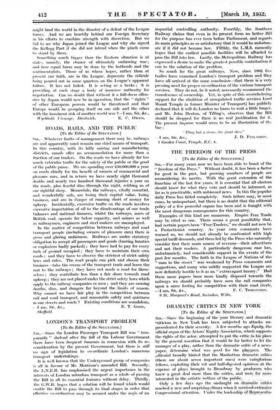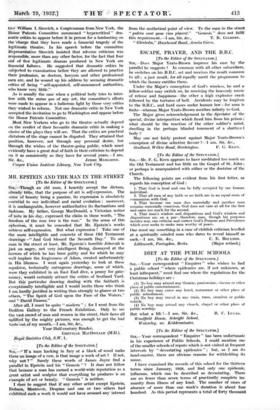DRAMATIC CRITICS IN NEW YORK
[To the Editor of the SPECTATOR.] Sni,--Sinee the beginning of the 'year literary and dramatic criticism in New York has been Subjected to attacks un- precedented for their severity. A few months ago Equity, the official organ of the Actors' Equity-Association, which supports the rights of the actor, attempted to put the critic in his place by the general assertion that it would be far better to let the manager of a play, rather than the dramatic critic of a news- paper, determine what was good for the playgoer. The editorial broadly hinted that the Manhattan, dramatic critics (there are about seven important ones) were vainglorious fellows, exploiting their wit and half-digested opinions at the expense of plays. brought to Broadway by producers who knew a- great deal more than the critics, and were far more interested in the artistic .welfare of the public. Only a few days ago the, onslaught on dean-mile e■dies reached a new and surptisingslimaxwhen it reCeive4 extensive. Congressional attention. Under time leadership of Eepresentu. tire 'William I. Sirovich, a Congressman froni New York, the thinic Patents Committee summoned "hypercritical " dra- Matie critics to appear before it in person for a lambasting on the 'charge that they have made a financial tragedy of the legitimate theatre. In his speech before the committee /tepresentative Sirovich insisted that adverse criticism was responsible, more than any other factor, for the fact that four Due of .five legitimate dramas produced in New York are financial failures. He suggested that dramatic critics be subjected to examination before they arc allowed to practise their prefesSion, as doctors, lawyers and other professional men are, and he wound up his address by accusing dramatic critics-of being " self-appointed, self-announced authorities, who know very little."
As is usually the case when a political body tries to inter- fere with the status quo of any art, the committee's efforts were made to appear in a ludicrous light by those very critics they-wished to reform. Not one dramatic critic in New York accepted the invitation to go to Washington and appear before the House Patents Committee.
Most New Yorkers who go to the theatre actually depend on the verdict of their favourite dramatic critic in making a choice of the plays they will see. That the critics arc practical dictators of the stage cannot be disputed. They attained that position, 'however, not through any personal desire, but through the wishes of the theatre-going public, which must evidently have a great deal of faith in their criticism to depend on it as consistently as they have for several years.—I am, Cooper Union Institute Library, New York City. _ .







































 Previous page
Previous page